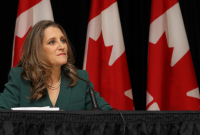Support strong Canadian climate journalism for 2025
In British Columbia, thousands of households are often forced to choose between paying their energy bills and buying basic needs like groceries: they deal with leaky windows that let heat and energy escape, and are left with few ways to make their homes efficient.
There are multiple programs at the federal and provincial level that offer reduced costs for heat pumps or deep energy efficiency upgrades, to help lower the barrier to those home improvements. However, they are almost all aimed at homeowners – leaving about a third of Canadians behind.
The experiences of renters in B.C. and the disadvantages they experience are detailed in a report released this week by Ecotrust Canada. The report draws from interviews with renters, housing providers, tenant organizations, and poverty reduction organizations to provide policy recommendations to address the systematic exclusion of renters from energy efficiency programs.
“A lot of the folks we talked with just felt very, very stuck in potentially really unsafe, unhealthy, and at the very least, profoundly uncomfortable living conditions, especially in the summers,” explained Dylan Heerema, a senior policy adviser at Ecotrust Canada.
The energy efficiency programs people can access in B.C. and across Canada are typically targeted at homeowners. Heerema points to the now dried up Canadian Greener Homes grant, which offered $125 to $5,000 to install heat pumps, swap out insulation and more. The federal government is currently developing its replacement, the Canada Greener Homes Affordability program, which will be available to low and medium-income households, including renters.
While Heerema said some energy efficiency programs are now available to renters, it doesn’t mean they target or explicitly include them. For example, in B.C., some heat pump programs allow renters to apply, but with the requirement that landlords support the application.
Even B.C.’s free air conditioning program that supplied 8,000 units last year isn’t cut and dry. Landlords in the province warned tenants not to install them in some cases, and Heerema stressed that many tenants can’t afford the additional cost of running an AC unit through the summer, which is “why we recommended in this report that we also we need to start looking at better and more public health-centric regulations for rental buildings.”
One recommendation suggests that municipalities create maximum temperature bylaws, which would require landlords to keep rental units below a certain temperature. Two jurisdictions in B.C. – New Westminster and View Royal on Vancouver Island – are considering implementing this bylaw. Heerema notes the bylaws don’t have to be prescriptive: landlords could install a heat pump or use passive measures to keep a home below the legal temperature.
As more municipalities consider similar measures, Heerema says the province should look at providing a framework to support their adoption of a maximum temperature policy, with the eventual goal of a province-wide requirement.
The adoption of maximum temperature bylaws should be married with financial incentives from municipal, provincial and federal governments that target mid-rise rental buildings specifically, Heerema said. Those were noted as especially vulnerable to extreme heat impacts in the report. However, he stressed that any incentives should include protections for tenants protecting them from renovictions and upgrade costs passed down.
Tax incentives, especially for “small and medium-sized landlords,” to allow them to “add heat pumps to their suites or do an envelope retrofit of their buildings” is one promising option, he said.
The report also highlighted mandatory energy efficiency assessments and efficiency labeling of rental units, and requiring landlords to pay utility bills (which would encourage them to invest in energy efficient cooling systems like heat pumps) as other policy solutions.
In response to the report, the Ministry of Housing pointed to the requirement in B.C.’s housing code that all new homes need to have one living space that does not exceed 26 degrees Celsius as a way the province is working to address overheating in buildings. The Ministry of Energy, Mines and Low Carbon Innovation highlighted the CleanBC program, which offers heat pump rebates, energy efficient windows and doors, and more. The program is available to renters, noted the ministry, with landlord approval.
The report builds on previous calls for consideration for renters in energy efficiency programs, such as a 2023 paper from Efficiency Canada that called on the federal government to add support for energy efficiency upgrades while protecting renters.
“The federal government has a natural incentive to take this issue seriously because renovations will be a big challenge if we are to meet our net-zero goals,” Abhilash Kantamneni of Efficiency Canada told Canada’s National Observer.
“...without adequate protections, landlords will just take the money and the incentives and end up renovicting existing tenants and raising rents. The flip side is if they keep ignoring rental housing, we’ll end up in a situation where the path to net zero will only benefit people who own housing. And I don't think the federal government wants that because they have committed to leaving no one behind in a net-zero future.”
Incentivizing landlords and building owners to make units more energy efficient would make homes more livable and safe in B.C., where much of the existing rental stock was built without extreme heat, wildfire smoke, and other climate impacts in mind. It’s also essential in lowering emissions from buildings, explained Heerema.
“It all fits in together. We know that over the long term, we need to be decarbonizing buildings… it's also really important that we remember that there's a housing crisis going on, and there's a public health crisis going on,” he said.
“So, doing it in a way that we need to make sure that we're not removing affordable housing from the market through redevelopments and retrofits, and also that we're not raising rent through allowable rent increases if we are doing retrofits of those buildings.”






Comments